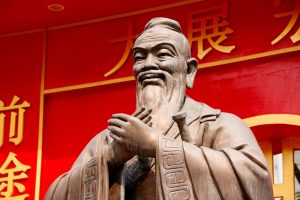How dangerous are Confucius Institutes? As tensions between the United States and China have grown, the Institutes (CIs) have become increasingly suspect in various corners. Changes in China’s domestic politics, including the development of a cult of personality around Xi Jinping, aggressive repression in Xinjiang, and most recently the protests in Hong Kong, have further served to bring the centers of China’s cultural foreign policy into disrepute. Still, CIs serve a variety of roles on college campuses, and in primary and secondary education.
A new book by Jennifer Hubbert, China in the World: An Anthropology of Confucius Institutes, Soft Power, and Globalization, examines that role that Confucius Institutes play in the manifestation of Chinese power abroad (Derek Sheridan’s fine review of the book appears here). Sheridan points out that Confucius Institutes have inspired a rare degree of bipartisan ire, evoking hostility both from left-leaning academic communities and from right-leaning state legislatures. On the one hand, this suggest that CIs may pose a real problem; on the other, such herding inevitably evokes concerns about politicized over-reaction.
Hubbert frames her discussion of CIs within an understanding of state policy as clumsy, limited tool of intervention. This is to say that the effects of state intervention may differ widely from the intent of the policy. As with any effort to generate “soft power,” good metrics of success are difficult to find. The United States own diplomatic establishment tends to understand this, appreciating that some projects undertaken to increase profile and influence simply won’t have a short-term (or even medium-term) impact. Evaluation of Chinese efforts is often overwhelmed by anxiety and threat-inflation, but of course Chinese soft power projects suffer from the same drawbacks.
Hubbert investigated the appeal of CI programs across several host countries, interviewing parents, students, and teachers in language and cultural courses. As Hubbert points out, there is much to Chinese culture beyond specific defenses of the practices of the CCP. The political project behind the CI often stood in tension with the actual practice of the CI; efforts to ensure sustained enrollment in language courses, for example, sometimes led to grade inflation and minimal increases in proficiency. Similarly, students on trips to China frequently escaped their handlers and came away with off-message lessons about Chinese culture and politics. Full disclosure: I took advantage of the opportunity to send my kids to the Confucius Institute’s week-long summer camp at the University of Kentucky. They learned some Chinese (most of which they soon forgot), but did not come home singing paeans to Benevolent Comrade Xi.
As Sheridan notes, Hubbert does not address many of the concerns about CIs that arise in the U.S. academic context, and which involve issues of academic freedom, the monitoring of students, and the control of discourse within a university setting. Hubbert focus on engagement at lower academic levels nevertheless serves as a useful corrective to some of the more aggressive criticisms of thee role that CIs play in the United States and elsewhere. There is undoubtedly space in the constellations of American academia for institutes that spread understanding of Chinese culture, even with the obvious political bent that CIs represent. At the same time, anyone interacting with a CI needs to appreciate the political foundation of the project.

































